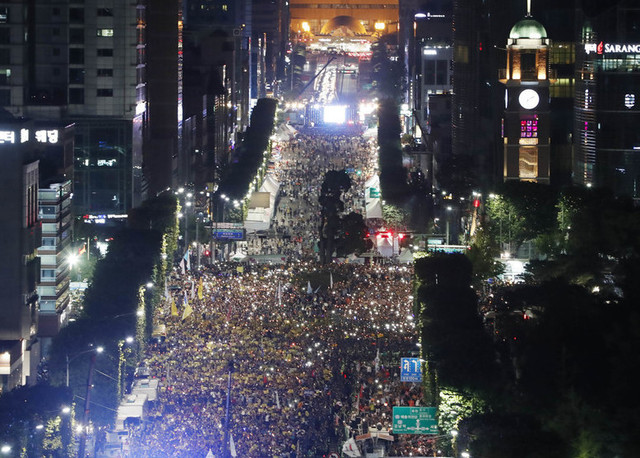Posted on : Oct.1,2019 16:56 KST
Modified on : Oct.1,2019 17:02 KST
 |
|
Civic demonstrators rally outside the Seoul Central District Prosecutors’ Office to call for prosecutorial reform on Sept. 28. (Lee Jeong-a, staff photographer)
|
On Sept. 30, South Korean President Moon Jae-in said that “the public is strongly calling for reform of the public prosecutors” and that “all public authorities must be humble before the public.” Just three days had elapsed since Moon’s previous appeal for prosecutorial reform on Sept. 27. Moon was effectively responding to a protest held on Sept. 28 in which more than a million candle-bearing citizens surrounded the Supreme Central District Prosecutors Office, slamming the prosecutors for their excessive investigation of Justice Minister Cho Kuk and calling for reform of the organization.
With these remarks, Moon was presumably calling for moderation in the prosecutors’ investigation and reconfirming his commitment to prosecutorial reform at a time when debate has stalled in the National Assembly over fast-tracked legislation. Although Prosecutor-General Yoon Seok-youl personally promised the public that he will do his best to reform his organization on Sept. 27 and on Sept. 29, there are strong suspicions that Moon and Yoon are neither talking about the same reform nor speaking to the same public. We hope that the prosecutors, under Yoon’s leadership, will take the protesters’ calls for reform to heart.
During the briefing on Monday, the Ministry of Justice proposed strengthening the criminal division and the trial division and revising rules about disclosing the identity of criminal suspects, and Moon agreed that those “bills are necessary for reform.” These measures are connected with the controversy over the ongoing investigation of Cho Kuk, which is being conducted by a large number of prosecutors from the special investigations division at the Seoul Central District Prosecutors Office, and over the publication of Cho’s status as an official suspect during that process.
On Sept. 27, Yoon promised to carry out the investigation “according to legal procedures, based on respect for human rights”; but then, just two days later, the prosecutors defended their controversial 11-hour raid on Cho’s house. That has prompted the Blue House and Justice Ministry to express discomfort about the attitude of the prosecutors, who have demonstrated little concern for “human rights” and “humility.” There are even indications that Yun’s decision to launch a raid on the house of the Justice Minister while Moon was in New York to attend the UN General Assembly and hold a summit with US President Donald Trump is being viewed as insubordination. That also seems related to the Justice Ministry’s decision to push through personnel assignments at the Supreme Prosecutors’ Office, including the head of the inspection division, without even running the assignments by Yoon.
“Many have called for improvement in the exercise of prosecutorial authority, standard practices in investigations, and organizational culture,” Moon said in comments aimed at Yoon, instructing him to “come up with a plan that the public can trust.”
While the prosecutors might feel pressured by such instructions, which come three days after Moon’s call for the prosecutors to be moderate in exercising their authority, Koreans hardly need to be reminded about muck-raging investigations into political enemies, often carried out by the special investigations department. Indeed, such investigations are at the heart of prosecutorial reform.
Even in the investigation of Cho and his family, the prosecutors don’t appear to be focusing on alleged corruption by public officials. In the investigation of the private equity fund, critics say, the prosecutors have disregarded charges against Cho’s distant cousin and a financier worth billions of won who is thought to be an accomplice in stock price manipulation and are instead zeroing in on Cho and his family. It’s time for the prosecutors to get back on the straight and narrow and take into account the constitutional principles of balance and proportionality.
Please direct comments or questions to [english@hani.co.kr]






